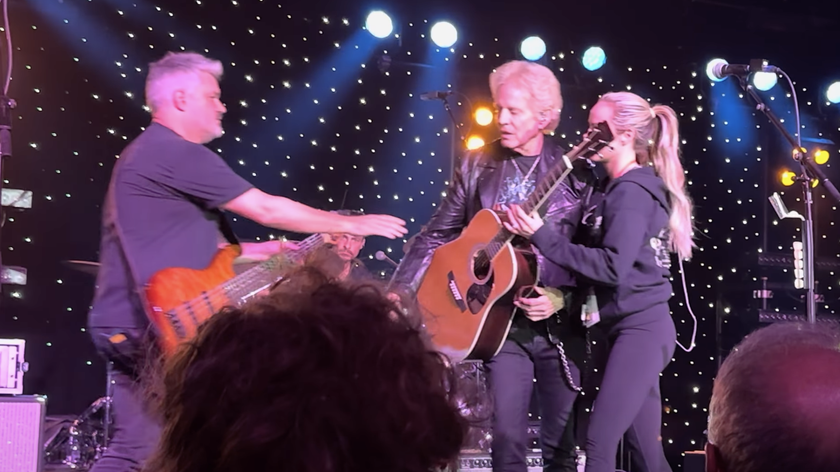“Listen, I’ve actually sat in a room with her and a guitar, watching those tiny hands finding all these weird jazz chords. She made it look so effortless.” Watch Amy Winehouse stun audiences with her voice and a Stratocaster
Known for her singular voice, Winehouse was also a talented guitarist

Thirteen years since her death, Amy Winehouse continues to be a cultural force. Last month saw her single “Back to Black” come storming back on several U.K. charts — including Official Hip-Hop, R&B Singles and Vinyl Singles — some 17 years after its initial release. Her legend only continues to grow through tribute events that take place regularly in the U.K. and U.S.
But while the world knows Winehouse for her songwriting and singular voice, what few seem to appreciate is that she wrote many of her songs on guitar, an instrument at which she was quite adept.
Take it from Pete Doherty, singer and guitarist for the Libertines, who was romantically involved with Winehouse. As Doherty told MusicRadar last April, Winehouse had a flair for harmonic invention.
“Listen, I’ve actually sat in a room with her and a guitar,” he said, “watching those tiny hands finding all these weird jazz chords. And her strumming patterns… crazy, off-kilter timings. She made it look so effortless.”
From an early age, Winehouse made electric guitar integral to her songwriting and performing, a musical tool that helped her pen her songs as well as perform them with a unique personal touch. Known to favor the Stratocaster, Winehouse first discovered this timeless Fender model in her pre-teenage years when her older brother bought a used instrument.
“It was the most beautiful thing in the world,” recalled Winehouse during an interview in 2004. “It’s such a beautiful guitar. I mean it’s got to be probably the most attractive guitar there is.”
Though Winehouse was forbidden to touch her brother’s Stratocaster she would carefully sneak into his room and play it whenever she had the chance. With strategic access to the instrument, Winehouse slowly began to get her chops together. And when she finally acquired her own guitar — an acoustic model — the siblings amicably swapped instruments back and forth.

“I just played every day. No one said to me, ‘You’ve got to play for at least this amount of time,’ " Winehouse recalled. “It was all I wanted to do.
"It’s so easy to teach yourself if you have love for guitar. People say to me all the time, ‘How come you taught yourself?’ And there’s things people can show you, but the truth is, if you learn how to play guitar off someone, you just kind of learn to play it like them, you know what I mean? And that’s why I can say that while I’m not even an adequate guitarist, I’m still a distinctive guitarist. I sound different.”
She would eventually use a Stratocaster to perform some of her best-known songs. Inspired by the likes of Carole King, PJ Harvey, and Shuggie Otis, Winehouse’s self-tuition coupled with a remarkable gift for songwriting resulted in a unique playing style that was her perfect musical accompaniment.
In this 2003 performance of “Stronger Than Me” (from her debut album Frank, released earlier that year) Winehouse wows the studio audience assembled at the BBC’s live music show Later… with Jools Holland, her inimitable rhythm guitar style proving to be the perfect accompaniment.
Below, we get to see a 20-year-old Winehouse up close as she stuns the crowd at London’s Wembley Arena with nothing more than her voice and a Stratocaster. In this 2004 all-star event marking the 50th anniversary of Fender’s iconic Stratocaster she goes it alone against a backdrop of guitar legends, including David Gilmour , Ronnie Wood, and Hank Marvin.
Finally, here’s Amy discuss her love of guitar and the Stratocaster in particular in a video celebrating that model’s 50th anniversary.
Get The Pick Newsletter
All the latest guitar news, interviews, lessons, reviews, deals and more, direct to your inbox!
Christopher Scapelliti is editor-in-chief of GuitarPlayer.com and the former editor of Guitar Player, the world’s longest-running guitar magazine, founded in 1967. In his extensive career, he has authored in-depth interviews with such guitarists as Pete Townshend, Slash, Billy Corgan, Jack White, Elvis Costello and Todd Rundgren, and audio professionals including Beatles engineers Geoff Emerick and Ken Scott. He is the co-author of Guitar Aficionado: The Collections: The Most Famous, Rare, and Valuable Guitars in the World, a founding editor of Guitar Aficionado magazine, and a former editor with Guitar World, Guitar for the Practicing Musician and Maximum Guitar. Apart from guitars, he maintains a collection of more than 30 vintage analog synthesizers.

“Thank you for your understanding, and remember – drink your water!” Former Eagles guitarist Don Felder feeling better after being rushed offstage by medical emergency

“She can shred any guy out there.” Joe Satriani says this young musician shows how guitarists are “playing better than guitar players have ever played before”
Most Popular












